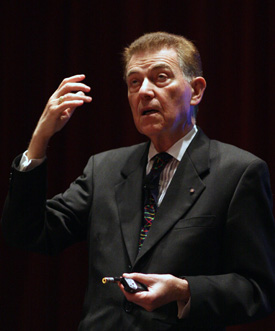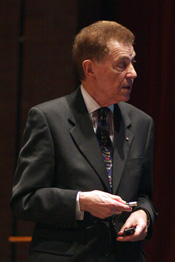As the crowd quieted in the Ball Theater on Thursday evening, a tall man with a thick Spanish accent approached the stage to give the 2009 Cole Lecture Series talk. Dr. Francisco J. Ayala, a native of Madrid, Spain, is a faculty member at the University of California in Irvine who teaches and performs research in biology. Ayala's lecture was entitled "Darwin's Gift to Science and Religion," and focused on the process of natural selection, its implications, and on the claims of Intelligent Design.
 Ayala began the lecture with the assertion that much of what is conventionally believed about Darwin is untrue. Evolution, for instance, was not a theory of Darwin's devising, as is so commonly believed. "One thing I will try to convey here is that Darwin's major contribution to science is not evolution, but rather natural selection," he said.
Ayala began the lecture with the assertion that much of what is conventionally believed about Darwin is untrue. Evolution, for instance, was not a theory of Darwin's devising, as is so commonly believed. "One thing I will try to convey here is that Darwin's major contribution to science is not evolution, but rather natural selection," he said.
Of the contemporary battlefields in politics, the debate regarding where religion should and should not enter is among the most hotly contested. However, in the scientific world, the issue is less derisive. Evolution, and particularly natural selection, stated Ayala, is a concept which is accepted in the same manner as gravity or atomic theory. Conversely, Intelligent Design as a theory is regarded largely without scientific weight. "Intelligent Design is not only not science," Ayala said, "but bad religion. It's just another way to inject religion into science, and to justify religion through science."
Ayala also went into the historical background and importance of Darwin's contributions to science, ranking it in terms of significance with Copernicus's Heliocentric theory. "There are two important scientific revolutions," Ayala said. "These two are the Copernican Revolution, and the Darwinian Revolution. In the same way that Copernicus moved the Earth out of the center of the Universe and replaced it with the Sun, Darwin removed humans from the center of the world through his book, On the Origin of Species. Jointly, these two revolutions represent all of the triumphs of science, and of everything science stands for."
Ayala next returned to assertions of Intelligent Design, and namely what he termed "the problem of design." William Paley's Natural Theology is Intelligent Design as seen in its earliest form. "Paley argues that as we look at organisms and at their aspects, we see again and again irrefutable evidence of design," Ayala said. "Where there is design, there must be a designer, Paley argues. He comes to the conclusion that God is the only possible designer. I am convinced that if Paley would have been aware of Darwin's natural selection, he would have accepted it."
 However, said Ayala, Darwin came up with an alternate, more viable, and above all more scientific solution: natural selection. "Evolution was actually already becoming established in Darwin's time," he said. "So Darwin asked himself what the purpose was of finding more evidence for evolution without understanding why it occurs. For the problem of design, Darwin provided a natural explanation: his Theory of Natural Selection. He in turn wrote his On the Origin of Species in 1859, which is about natural selection and not evolution."
However, said Ayala, Darwin came up with an alternate, more viable, and above all more scientific solution: natural selection. "Evolution was actually already becoming established in Darwin's time," he said. "So Darwin asked himself what the purpose was of finding more evidence for evolution without understanding why it occurs. For the problem of design, Darwin provided a natural explanation: his Theory of Natural Selection. He in turn wrote his On the Origin of Species in 1859, which is about natural selection and not evolution."
Ayala quoted from Darwin's most famous work his perhaps most famous line:"This preservation of favorable variations and the rejection of injurious variations, I call Natural Selection." In response to the seemingly somber mood of the audience, Ayala jested that "Darwin did not write this with a Spanish accent."
Proceeding to many of the technical details of both evolution and natural selection, Ayala cited both the islands of Hawaii and of the Galapagos as prime examples which vividly portray Darwin's theory in action. In good humor, he poked fun at one of the problems Intelligent Design has yet to deal with. "Mammals, we have seen, are perfectly capable of thriving on Hawaii," he said. "If Intelligent Design is to be taken as true, then why before the missionaries were there no mammals on Hawaii? Did the good Lord forget about them?"
Throughout the lecture, Ayala made it clear that he was a religious man. Indeed, it was in part his concept of religion which led him to reject Intelligent Design, aside from the fact that it is unscientific. "Intelligent Design is incompatible with religion," he said. "It implies an imperfect, incompetent, dysfunctional design." Another important aspect that Intelligent Design lacks which natural selection makes up for is its ability to explain the presence of evil. "I think by introducing the theory of natural selection, Darwin brought one solution to the problem of the presence of evil in the world," he said. "This was his gift to religion."
Ayala's lecture elicited many varying reactions from the audience. Senior biology major Juan Carlos Venis was satisfied particularly with what the talk had to say about debunking Intelligent Design. "I enjoyed it, overall," he said. "I thought his way of dissecting Intelligent Design and showing how lot's of components coming together for a purpose does not imply anything other than a natural process. I like that he showed how unscientific it is to assume a designer from a design. Also, he showed that it's an imperfect design, and his examples of oddities only explainable through natural selection were excellent."
Photos by Drew Casey '12